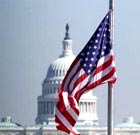|
|
|
Democrats demand interrogation memos
Political and Legal |
2007/10/05 08:44
|
Senate and House Democrats demanded Thursday to see two secret Justice Department memos that reportedly authorize painful interrogation tactics against terrorism suspects. The memos -- legal opinions written in 2005 -- do not reverse the administration policy issued in 2004 that publicly renounced torture, White House and Justice Department spokespeople said. Senate Intelligence Committee Chairman John D. Rockefeller IV (D-W.Va.) sent a letter to the acting attorney general saying the administration's credibility was at risk.
The memos are "critical to an appropriate assessment" of tactics approved by the White House and the Justice Department, Rockefeller wrote to Acting Atty. Gen. Peter D. Keisler. "Why should the public have confidence that the program is either legal or in the best interests of the United States?" he asked.
House Judiciary Chairman John Conyers Jr. (D-Mich.) and House Judiciary Committee member Jerrold Nadler (D-N.Y.) promised a congressional inquiry into the memos, which reportedly explicitly authorized painful and psychological tactics.
"Both the alleged content of these opinions and the fact that they have been kept secret from Congress are extremely troubling, especially in light of the department's 2004 withdrawal of an earlier opinion similarly approving such methods," Conyers and Nadler wrote to Keisler on Thursday. Their letter requested copies of the memos.
They also asked that Steven G. Bradbury, who heads the Justice Department's Office of Legal Counsel, "be made available for prompt committee hearings."
The New York Times disclosed the memos in Thursday's editions. It reported that the first 2005 legal opinion authorized the use during terrorism interrogations of slaps to the head, freezing conditions and simulated drownings, known as water-boarding.
That secret opinion explicitly allowed using the painful methods in combination and was issued "soon after" Alberto R. Gonzales became attorney general in February 2005, the New York Times reported. In a December 2004 opinion, the Justice Department had publicly declared torture "abhorrent," and the administration seemed to back away from claiming authority for such practices.
A second secret Justice Department opinion was issued later in 2005, as Congress was working on an anti-torture bill. That opinion said none of the CIA's interrogation practices would violate the legislation's bans on "cruel, inhuman and degrading" treatment of detainees, the New York Times said, citing interviews with unnamed current and former officials.
The December 2004 legal opinion remains in effect, Justice Department spokesman Brian Roehrkasse said.
"Neither Atty. Gen. Gonzales nor anyone else within the department modified or withdrew that opinion," Roehrkasse said in a statement. "Accordingly, any advice that the department would have provided in this area would rely upon, and be fully consistent with, the legal standards articulated in the December 2004 memorandum."
White House Press Secretary Dana Perino told reporters: "This country does not torture. It is a policy of the United States that we do not torture, and we do not."
Perino would not comment on whether the 2005 opinions authorized specific interrogation practices, such as slaps to the head and simulated drowning. She initially said the first classified opinion was dated Feb. 5, 2005, but White House spokesman Tony Fratto corrected that, saying the memo was dated months later. Another administration official said it was dated May 2005.
The dispute may come down to how the Bush administration defines torture, and whether it allowed U.S. interrogators to interpret anti-torture laws beyond legal limits.
Perino said the president "had done everything within the corners of the law to make sure that we prevent another attack on this country."
CIA spokesman George Little said the agency sought guidance from the Bush administration and Congress to make sure its program to detain and interrogate terrorism suspects followed U.S. law.
"The program, which has taken account of changes in U.S. law and policy, has produced vital information that has helped our country disrupt terrorist plots and save innocent lives," Little said in a statement. "The agency has always sought a clear legal framework, conducting the program in strict accord with U.S. law, and protecting the officers who go face to face with ruthless terrorists."
Congress has prohibited cruel, inhuman and degrading treatment of terrorism suspects. Sen. John McCain (R-Ariz.) said several extreme techniques, including water-boarding, were specifically outlawed. |
|
|
|
|
|
|
Class action or a representative action is a form of lawsuit in which a large group of people collectively bring a claim to court and/or in which a class of defendants is being sued. This form of collective lawsuit originated in the United States and is still predominantly a U.S. phenomenon, at least the U.S. variant of it. In the United States federal courts, class actions are governed by Federal Rules of Civil Procedure Rule. Since 1938, many states have adopted rules similar to the FRCP. However, some states like California have civil procedure systems which deviate significantly from the federal rules; the California Codes provide for four separate types of class actions. As a result, there are two separate treatises devoted solely to the complex topic of California class actions. Some states, such as Virginia, do not provide for any class actions, while others, such as New York, limit the types of claims that may be brought as class actions. They can construct your law firm a brand new website and help you redesign your existing law firm site to secure your place in the internet. |
Law Firm Directory
|
|





